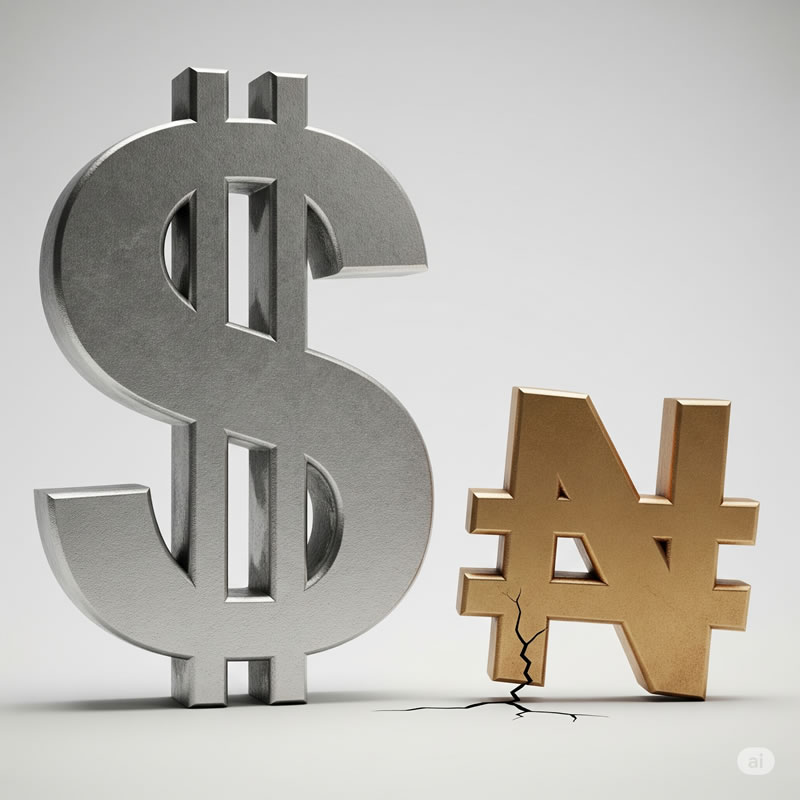Naira depreciation against dollar August 2025
- Author
- Emmanuel
Overview: A Volatile Week for the Naira
The Nigerian Naira suffered a notable decline in value against the US Dollar over the week ending August 1, 2025. The parallel market exchange rate rose consistently each day, climbing from ₦1,537/$ on July 27 to ₦1,558/$ by July 31, representing a ₦21 drop in value over just five trading days.
This represents one of the most significant weekly depreciations of the Naira in recent months, with average daily increases between ₦2 to ₦6. Such a sustained upward trend in the exchange rate has raised concerns about Nigeria’s foreign exchange stability and the effectiveness of ongoing monetary policies.
🔢 Daily Exchange Rate Movement
| Date | Rate (₦/$) | Daily Change | Closing Rate |
|---|---|---|---|
| July 27 | ₦1,537 | +₦1 | ₦1,538 |
| July 28 | ₦1,540 | +₦2 | ₦1,542 |
| July 29 | ₦1,545 | +₦3 | ₦1,546 |
| July 30 | ₦1,552 | +₦6 | ₦1,553 |
| July 31 | ₦1,558 | +₦5 | ₦1,560 |
| August 1 | Market paused |
📈 Weekly Total Increase: ₦21
📊 Average Daily Increase: ₦4.2
What Caused the Naira’s Sudden Weakness?
Several interrelated factors may have contributed to the rapid depreciation of the Naira during this week:
1. Foreign Exchange (FX) Supply Crunch
The Central Bank of Nigeria (CBN) has recently scaled back dollar interventions in the official market, leading to reduced liquidity in the parallel market. As a result, demand continues to outpace supply, driving up black-market rates.
2. Speculation and Panic Buying
As rates began to climb early in the week, traders and importers rushed to secure dollars, anticipating further depreciation. This speculative behavior likely added fuel to the fire, exacerbating the upward trend.
3. External Reserves Pressure
Recent reports indicate a drop in Nigeria’s external reserves, sparking fears about the country’s ability to meet foreign obligations. A weaker reserve position often undermines confidence in the local currency.
4. Delayed Repatriation of FX Earnings
Exporters and diaspora remittance agents may be withholding FX earnings, preferring to wait for better rates or choosing unofficial channels with more favorable returns. This delays the return of much-needed foreign currency to the market.
5. Monetary Policy Uncertainty
The CBN’s unclear stance on interest rates and FX liberalization may also be affecting investor sentiment. Lack of clarity on policy direction has kept foreign portfolio inflows subdued, reducing dollar availability.

Expert Opinion
According to Naira FX analysts, this pattern signals a widening gap between official and parallel market rates, a situation that may worsen without swift interventions.
"We’re witnessing a critical moment in Nigeria’s FX market. Without robust inflows or confidence-boosting policies, the Naira may struggle to regain stability in the near term."
— Naira FX Market Analyst
Naira Outlook: What to Expect in the Coming Week
Heading into the first week of August, traders and businesses should prepare for continued volatility. Unless there’s a decisive move by the CBN to increase dollar supply or enforce FX policy reforms, the Naira may slide further.
Key factors to monitor:
- CBN’s intervention in the I&E (Investors and Exporters) window
- Changes in oil prices (Nigeria’s key FX earner)
- External debt payments and foreign reserve movements
- Political or fiscal announcements from the FG
Conclusion
The Naira’s sharp fall this week has reignited concerns about Nigeria’s macroeconomic stability and foreign exchange management. As always, Naira FX remains committed to providing real-time, data-driven insights to help you navigate the ever-changing forex landscape.
Stay Updated
💬 Join our Naira FX WhatsApp Community for live rates, breaking forex news, and expert analysis.


